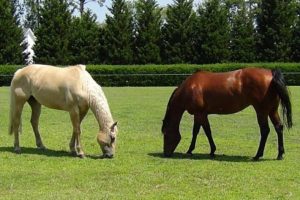Main Content

Winter cold can be tough on a horse. If they have been out in the cold, they may have shed some of those extra pounds. On the other end, if your horse had little exercise and lots of feed it may have put on a few pounds. How do you know if your horse is in good condition after the winter?
If your horse has spent a long time under a blanket, you may not have been looking at it that closely. Or if your horse grew a heavy winter coat, perhaps you have not noticed if it has gained a few pounds or lost a significant amount of weight. Knowing how to assess the body condition of your horse can help you adjust your feeding plan for the next season. There is a great resource from the Kentucky Research Center which can help you decide if your horse needs to drop a few pounds, gain some weight, or if it is “JUST RIGHT”.
Body Condition Score is a scale from 1-9, with 1 being “POOR” (and in need of immediate attention by your veterinarian) to 9 being “EXTREMELY FAT” (or very over-conditioned) and in need of a “diet” and probably more exercise to reduce some of the fat deposits on its body. If you go to the website and download the document you can use the scale as a tool for assessing your own animal and to help you decide if you need to adjust your feeding regimen. It is always best to solicit input from your veterinarian if there has a been a drastic change in the score for your horse. Internal parasites (like worms) can cause dramatic weight loss, and certain metabolic conditions can also either increase or decrease an animal’s weight.
A horse that is well exercised may have a body condition score of a 3 (THIN) because it is very active and expends its calories. Therefore, it does not have extra calories to lay down much fat. This might be a common score for a race horse or active jumper. Most folks probably want to have their horses around the 4 (MODERATELY THIN) to 5 (MODERATE) range if they get an average amount of exercise. Remember, too much fat covering on a horse is not any better than too much fat covering for us humans!
By Carol K. Ward, Somerset County 4-H Agent, Rutgers Cooperative Extension